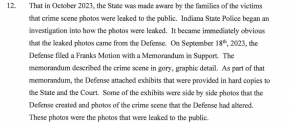So aside from the knife, I see they have an unspent bullet from his gun at the CS and the defense tried to have that information suppressed. That's worrisome from the other side of things. If the defense lacked enough confidence to go head-to-head on the scientific validity of that-- it's not inspiring confidence in the defense, either, to put it mildly. Right, I know the fact that they tried to have it suppressed will be hidden from the jury (pretty sure that's how that works), but it's not hidden now. Glad they're allowing that evidence in.
This isn't how it works. They don't just decide not to challenge evidence because they feel confident enough that they can convince a jury it isn't scientifically valid. If they were going to argue to the jury that it wasn't scientifically valid and decided not to challenge that it could be admitted, and had a reasonable basis to request that it was suppressed based on the Frank's standard, then they would be
actually incompetent, negligent counsel.
Even if it delays things I won’t she doesn’t because she has done nothing wrong.
SBM. The supreme court of Indiana disagrees…
Honestly, the D were ordered to stop working the case in early October. The new D was waiting in limbo if they were even staying on the case. When was anyone supposed to be moving on this? I am hopeful this get beck on track soon.
Interesting they haven't discovered anything.
Kevin Greenlee stated on TMS today that they only need to discover based on a new rule effective 1/1/24. However State did previously request discovery from them back when D asked for discovery deadline.
Indiana rules on criminal procedure re discovery state that the defense discovery is due within 30 days of state submitting their discovery
Read Rule 2.5 - Discovery, Ind. R. Crim. P. 2.5, see flags on bad law, and search Casetext’s comprehensive legal database
casetext.com
(C) Disclosures by the Defense(1) Within thirty days after the prosecutor's disclosure, the defense must furnish the state with the following material and information within the defense's possession or control:
(a) The names and last known addresses of persons whom the defense intends to call as witnesses, with their relevant written or recorded statements. The defense may refrain from providing a witness' address or other contact information under this rule if the defense in good faith believes the disclosure of the witness' address or other contact information may jeopardize the safety of the witness or the witness' immediate family. If the defense does not disclose the witness' address or other contact information in its possession for the reason stated under this rule, then the defense must make the witness available to the state upon reasonable notice.
(b) Any books, papers, documents, photographs, or tangible objects the defense intends to use as evidence.
(c) Any reports or statements of experts, made in connection with the particular case, including results of physical or mental examinations and of scientific tests, experiments, or comparisons, that may be used at a hearing or trial.
(2) The defense must disclose any statutory defense in writing by the statutory deadline or, if there is no statutory deadline, within a reasonable time.
 drive.google.com
drive.google.com


